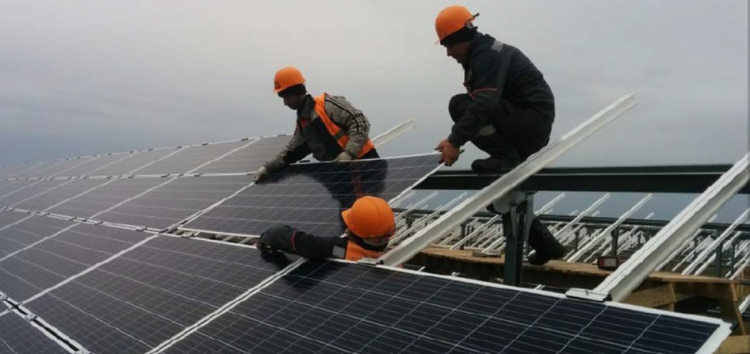Nineteen renewable energy projects worth $1.1 billion are now officially on the docket for Kazakhstan’s latest effort to go green and diversify its energy supply. Nine projects will be launched by December supported by Kazakh Invest, which is the main company responsible for overseeing the country’s investments and assisting investors who want to get involved in Kazakhstan.

Workers are building Saran power plant in the Karaganda Region. The European Bank for Reconstruction and Development and Green Climate Fund, among the biggest international organisations supporting the industry, invested $73.5 million in the plant. Photo credit: EBRD
There are already 97 operating renewable energy facilities with a total power capacity of 1,260 megawatts in the country. 697 megawatts are generated from solar power plants, 336 megawatts from wind power plants and 224 megawatts from hydro and biopower plants.
While more than 70 percent of Kazakhstan’s electricity is currently produced at coal-fired plants, most of which are outdated, the development of renewable energy is an integral part of the country’s effort to transition to low-carbon development, diversify the economy and bring private capital and investments into the country.
Global renewable electricity output is expected to accelerate by 50 percent by 2024, mostly as a result of cheap solar power and Kazakhstan seeks to bring its share of renewable energy to three percent in 2020, ten percent by 2030 and 50 percent by 2050. Luckily, the country possesses vast natural resource resources and a favorable landscape to tap into that potential.
2019 has witnessed strong growth in renewable energy production with 2.4 billion kilowatt-hours of renewable energy generated. According to forecasts, this could prevent the annual emissions of 2.3 million tonnes, 190,000 tonnes of polluting substances into the atmosphere and 500,000 tonnes of ash and slag materials.
In 2019, twenty-one renewable projects attracted $613 million in investments from such companies as Dera, Solarnet Investment GmbH, UniversalEnergy and Risen Energy and ENI, among others.
Central Asia’s largest Saran solar power plant, located in the Karaganda Region, began operating in February 2019. The cost of the project with a 100-megawatt capacity is $137 million. Solarnet Investment GmbH, an affiliate of German developer Goldbeck Solar, built the power station.
Since the beginning of the year, six renewable projects were commissioned in Kazakhstan and the Energy Ministry expects renewable energy production to reach around three billion kilowatt-hours in 2020.
“The attractiveness of the renewable energy industry is growing year by year. Renewable energy is currently an important aspect of the country’s social and economic development, which not only provides the country with green energy but also creates jobs for our citizens. It has great potential for development and growth when you take into account Kazakhstan’s current needs and technological capabilities,” said Aliya Salimzhuarova, renewable energy project manager at Kazakh Invest.
She noted that the legal framework had also improved. The government switched from feed-in tariffs in 2017 to an auction mechanism meant to allow setting competitive market prices and for the best projects to be selected. Auctions are held at the KOREM open electronic trade system and the lifespan of an auction tariff is 15 years.
In February, Kazakhstan also included its renewable energy industry in the list of priority investment projects, pledging to tackle one of the problems most renewable energy facilities encounter – high capital tax, as nearly 80 percent of costs are racked up in the purchase of expensive equipment.
The recent move will allow investors to receive a range of tax breaks and customs benefits as part of the investment deal with the Investments Committee of the Kazakh Foreign Ministry.
The United Nations Development Programme (UNDP) in Kazakhstan also supports low-carbon city development and small-scale renewable projects in conjunction with the Ministry of Energy, Ministry of Industry and Infrastructure Development and Damu Business Development Fund.
“Financial support mechanisms are provided to businesses that have energy-saving projects in such sectors of the city’s economy such as heat supply, water supply and sanitation, public and residential buildings, street and indoor lighting systems. Companies can receive a ten percent reduction in their loan rate, can have their main debt written off by 40 percent as an investment subsidy and can get a loan guarantee in second-tier banks from the Damu Fund,” said Kazakh Invest in its statement.
As of March, more than 30 companies received support and implemented 37 green projects worth more than $10 million, including a lighting modernisation project at the Transport Towers building in Nur-Sultan, and heat supply system modernisation in nine schools in Shieli town in the Kyzylorda Region.

